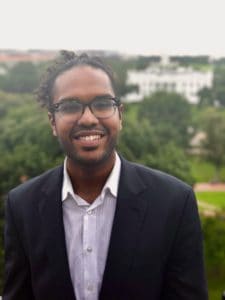Trainee Spotlight: Khristopher Mark Nicholas
Name: Khristopher Mark Nicholas
Current title: CPC Trainee; 3rd year PhD student, Department of Nutrition, Gillings School of Global Public Health
Years affiliated with CPC: 2018 – present

What projects are you currently working on?
My primary research centers on characterizing food environments in the Galapagos islands of Ecuador. One component involves space-time analyses to quantify and depict these environments. An epidemiological component links these environments with dietary intake and health status and a third qualitative component seeks to unpack community perceptions around potential health interventions. For each interdisciplinary component, I get to work with stellar CPC Faculty Fellows, namely Drs. Amanda Thompson, Peggy Bentley, Paul Delamater, and Linda Adair. I am also working with CPC Fellow Dr. Clark Gray on a project studying climate vulnerability and stunting among indigenous populations in Peru. Lastly (in my clearly abundant free time), I co-host a podcast with CPC Trainee Allison Lacko about food, social justice, and culture called We All Gotta Eat!
What was your background before coming to CPC?
I completed an undergraduate degree in Sustainable Development from Columbia University and then crawled in Long Island attics for two years (seriously). My undergraduate research took me to Myanmar where I studied biodiversity loss and deforestation linked to oil palm cultivation and Bangladesh studying spatiotemporal patterns in agricultural productivity and how these changes impact rural farmers. As an undergraduate, I also worked at the Clinton Foundation specializing in renewable energy projects for underserved populations. After graduation, I joined a renewable energy startup based in Long Island where I crawled in attics by day and did product development by night (in between coughing the fiberglass out of my lungs). And now here I am!
What motivates you to do what you do?
I am originally from Trinidad and Tobago and grew up in low-income South Florida communities. Disparities in health in these communities (and, unfortunately, many communities like these) are all too common. Once we enlarge the scale from community to state, then regional, then international levels, these gaps in opportunity and access become even more stark. My hope is that the research we do at the CPC serve as important first steps in bridging these gaps.
What have been some of your best experiences at CPC?
“Interdisciplinary” is a buzzword that’s often thrown around casually. Usually, when I explain to folks why spatial statistics, nutrition epidemiology, and qualitative research should go hand in hand, there’s no shortage of doubt. At the CPC, the Trainees and Fellows all do such different and all-encompassing work that I feel like I fit right in! I can walk two doors down to talk to a GIS expert and then around the hall to chat with my primary advisor at her office, making collaboration so much fun. And all this before my midday coffee break.
Do you have any advice for current or future trainees at CPC?
If I could sum it up in three words: mindfulness of context. Health disparity research (and research among disadvantaged communities in general) locally and globally is so important. Yet we often get caught up in the “what” that we forget there is a “who”; a real-life population with needs and opinions and privacy and customs that we should acknowledge and respect. You want to do international research? Great! Collaborate with people from that country, especially if you will conduct your own data collection. Want to do research involving vulnerable populations? Great- ensure that you navigate the proper avenues to address their needs, answer the questions they want to ask, and report your findings in culturally respectful and appropriate ways.
